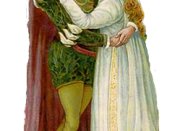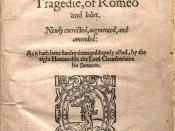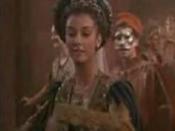Only fools rush into love without thinking of the consequences that come with it. For example, in William Shakespeare's Romeo and Juliet, one of the main characters, Romeo, proves that hastiness and love do not mix. His impulsive, romantic (idealistic) nature are factors that eventually lead to his death.
Romeo's impulsiveness puts him in danger many times. When Tybalt and Mercutio are dueling, Romeo makes an attempt at keeping the peace between them (since he just married Tybalt's cousin, Juliet.) This all changes when Tybalt slays Mercutio and Romeo chases after Tybalt to get his revenge not thinking about the consequences lying ahead:
"Alive in triumph and Mercutio slain....And fire-eyed fury be my conduct now!....For Mercutio's soul is but a littleway above our heads, staying for thine to keep him company. Either thou or I, or both, must go with him."
(Shakespeare III.i.122-129)
Not only is Romeo impulsive, but also has a very romantic/idealistic nature that also leads him into trouble.
Romeo's romantic and idealistic nature kept him unconcerned and uninformed of many things and he "fell in love" many times before Juliet. An example of this character trait is when he had just met Juliet and after being "in love" with Rosaline, he had fallen "in love" with Juliet. The Friar mentions to him that he is not in love with Rosaline or Juliet but he actually is in love with love itself:
"Holy Saint Francis, what a change is here!
Is Rosaline, whom thou didst love so dear,
So soon forsaken? Young men's love then lies
Not truly in their hearts, but in their eyes."
(II.iii. - )
This idealistic nature of his leads him to be unaware and uninformed of many important details and this leads him to his downfall.
Romeo's impulsiveness, his way of...


